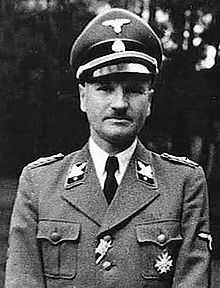Ernst-Robert Grawitz
| Ernst-Robert Grawitz | |
|---|---|
 | |
| Born |
8 June 1899 Charlottenburg |
| Died |
24 April 1945 (aged 45) Potsdam-Babelsberg |
| Allegiance |
|
| Service/branch |
|
| Rank |
|
| Battles/wars | World War II |
Ernst-Robert Grawitz (8 June 1899 – 24 April 1945) was a German physician (and an SS Reichsarzt) in Nazi Germany during World War II. He was born in Charlottenburg and died in Potsdam-Babelsberg.
Early life and career
Grawitz was born in Charlottenburg, in the western part of Berlin, Germany. As Reichsarzt SS and Polizei (Reichsphysician SS and Police), Grawitz advised[citation needed] Reichsführer-SS Heinrich Himmler on the use of gas chambers. Grawitz was also head of the German Red Cross. His wife, Ilse, was the daughter of SS-Obergruppenführer und General der Waffen-SS Siegfried Taubert.
Towards the end of World War II in Europe, Grawitz was a physician in Adolf Hitler's Führerbunker. When he heard that other officials were leaving Berlin in order to escape from advancing Soviet armies, Grawitz petitioned Hitler to allow him to leave; his request was denied.
Death
As the Soviets approached, a grenade exploded in Grawitz's house in Babelsberg, killing him, his wife and his children. It has been assumed that the grenade was activated by Grawitz himself, which would make this event a murder-suicide. The event was depicted in the 2004 historical film Der Untergang ("Downfall"), in which Grawitz was portrayed by Christian Hoening.
References
| |||||||||||||||||||||||||||||||||||||||||||||||||
|
.svg.png)